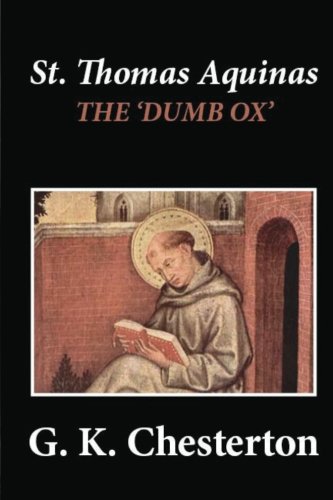St. Thomas Aquinas: 'The Dumb Ox' - Softcover

Zu dieser ISBN ist aktuell kein Angebot verfügbar.
Alle Exemplare der Ausgabe mit dieser ISBN anzeigen:
Reseña del editor:
All of the usual caveats about Chesterton's writing apply here: he cannot resist a digression, he cannot resist an alliterative allusion, he cannot resist a pun. He is so full of life that he is constantly threatening to spin out of control. He is not a scholar, he is not writing a sober appraisal, he is probably not sure of most of the biographical details of his subject. In spite of these defects, the book is a triumph. Chesterton is the embodiment of "A Man in Full"; he is the polar opposite of C.S. Lewis' "Men without Chests". He is so full of good sense, penetrating insight, sound moral judgement, and the joy of life that it is all spilling out in every direction. Anyone who has read his book of literary criticism on Dickens will understand these points: this is criticism in an old key; it is appreciative criticism; it is an encounter with a writer by an entire man, and not just by a theory. It is wonderfully refreshing. No one today writes in a similar vein. Chesterton brings all of his larger-than-life presence to bear on this account of the life (sort of) and thought of one of history's great minds. And on just what aspect of Thomas' thought does he focus? In one diabolically politically incorrect section near the end of the book he bellows out that "on a map like the mind of Aquinas the mind of Luther was barely a speck", although he would hasten to add that his little book suffers the same ignoble comparison. There is a great deal to Thomas that he, of necessity, leaves out. But what he does include is very astutely chosen, for he understands the basic structure of Thomas' thought and emphasizes the essentials. Thus there is a chapter on Thomas' argument with the Manicheans and his affirmation of the goodness of the world. He treats with great aplomb Thomas' notion of "being" and its relation to God. He does great honor to Thomas' mode of argumentation, to his sober balance and fair treatment of opponents. He is appreciative of the devotional side of Thomas, which does not come through explicitly in his philosophical writings but is important for an understanding of the man. It must be granted that the book is as much about Chesterton as it is about Aquinas. Those wanting a more straight-forward treatment should seek out one of Josef Pieper's books on Aquinas. But if you have any adventurous spirit, by all means read this book. It is written by a man who loves and understands his subject in his very bones, and who brings his subject to life in a way that is most uncanny.
Biografía del autor:
Gilbert Keith Chesterton (1874–1936) was an English writer. His prolific and diverse output included philosophy, ontology, poetry, play writing, journalism, public lecturing and debating, literary and art criticism, biography, Christian apologetics, and fiction, including fantasy and detective fiction. Chesterton has been called the "prince of paradox". Time magazine, in a review of a biography of Chesterton, observed of his writing style: "Whenever possible Chesterton made his points with popular sayings, proverbs, allegories—first carefully turning them inside out." For example, Chesterton wrote "Thieves respect property. They merely wish the property to become their property that they may more perfectly respect it." Chesterton is well known for his reasoned apologetics and even some of those who disagree with him have recognized the universal appeal of such works as Orthodoxy and The Everlasting Man. Chesterton, as a political thinker, cast aspersions on both liberalism and conservatism, saying, "The whole modern world has divided itself into Conservatives and Progressives. The business of Progressives is to go on making mistakes. The business of the Conservatives is to prevent the mistakes from being corrected." Chesterton routinely referred to himself as an "orthodox" Christian, and came to identify such a position with Catholicism more and more, eventually converting to Roman Catholicism from Anglicanism. George Bernard Shaw, Chesterton's "friendly enemy" according to Time, said of him, "He was a man of colossal genius".
„Über diesen Titel“ kann sich auf eine andere Ausgabe dieses Titels beziehen.
- VerlagCreatespace Independent Pub
- Erscheinungsdatum2012
- ISBN 10 148127435X
- ISBN 13 9781481274357
- EinbandTapa blanda
- Anzahl der Seiten110
- Bewertung
EUR 3,37
Versand:
EUR 3,71
Innerhalb der USA
Beste Suchergebnisse beim ZVAB
St. Thomas Aquinas: 'The Dumb Ox'
Verlag:
CreateSpace Independent Publishi
(2012)
ISBN 10: 148127435X
ISBN 13: 9781481274357
Gebraucht
paperback
Anzahl: 1
Anbieter:
Bewertung
Buchbeschreibung paperback. Zustand: Very Good. Artikel-Nr. mon0003409063
Weitere Informationen zu diesem Verkäufer | Verkäufer kontaktieren
Gebraucht kaufen
EUR 3,37
Währung umrechnen

